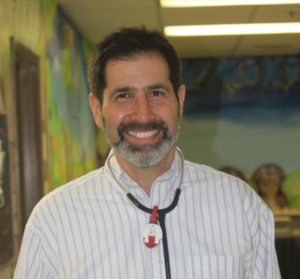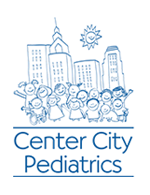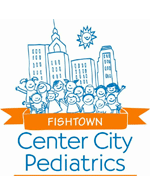
Medical Director
The schedule of preventive medicine visits (Well Visits) is designed with this goal in mind. However, these are extraordinary times. Our focus must shift to emphasizing physical health.
As such, we are asking for you to stay home as much as possible to prevent the ongoing spread of the virus from being transmitted by people who are carriers but not yet developing symptoms. Click here for more guidance on effective social distancing.
For children over 18 months of age with stable medical conditions and children that are coming to the office primarily for developmental and behavioral concerns, we urge you to consider rescheduling in 3-4 months. Undoubtedly, this will create a burden for you and for us. When this crisis settles down, and we are confident it will, we will have a significant backlog of children that need to be seen. We understand this, but feel that the health of everyone – your children and our staff – is more important at this point.
We advise that well child visits for children 0 – 18 months old and children with acute illnesses for whom our triage staff advises office visits still be seen in the office. Keeping your child’s vaccines up to date and staying on top of early developmental milestones and weight gain is crucial.
For the safety of our staff and patients, we are asking families to reschedule any well visit or consult visit if you or your child has traveled abroad or had exposure to someone confirmed to have COVID-19, or if you or your child has developed a fever or cough by the time your appointment day arrives. The reschedule period will be at least 14 days after return or after the known COVID-19 exposure. For those with fever or cough, we ask that you reschedule after resolution of fever (temperature < 101F for at least 24 hours without fever-reducer) or cough illness. If you believe your visit is urgent, please speak with our triage staff to determine the safety of rescheduling. We will be unable to see you if you have not been screened by nurse triage. Finally, due to the high rates of COVID-19 in the Montgomery County region, our Bala Cynwyd office will no longer be seeing patients with fever or respiratory concerns. You may be referred to one of the two nearby Urgent Care sites (CHOP Urgent Care or PM Pediatrics) or advised to come to the Center City location. We are going through these uncertain times together. We request your patience. Please work with us and the community to keep all of our kids and your families healthy. Sincerely, Eric
Frequently Asked Questions
We are providing the following information in conjunction with the Centers for Disease Control and Prevention (CDC) to help keep our patients and families informed about the 2019 novel coronavirus (COVID-19). The following are answers to frequent questions we have been receiving.
Updated March 12, 2020
Q: What is the 2019 novel coronavirus, or COVID-19?
Coronavirus is the name of a large family of virus. Some cause infection specifically in humans while others cause infection in animals. There are many types of human coronaviruses, including some that cause the common cold. Rarely, animal coronaviruses may develop the ability to also infect humans.
COVID-19 is a disease caused by a new (novel) coronavirus that has not previously been seen in humans, and is thought to have originated from an animal coronavirus in Wuhan, China. The name of this disease was chosen by the World Health Organization and stands for Coronavirus Disease 2019. Currently, COVID-19 is the cause of a contagious respiratory infection in humans that has been spreading across the world. It is NOT the same thing as MERS or SARS-CoV, two other coronavirus diseases that originated from animals and then spread to people.
More information on the origin of COVID-19 can be found here.
Q. What are the symptoms of COVID-19 infection?
Reported illness in confirmed COVID-19 cases around the world range from mild symptoms for the majority of those affected, to severe respiratory illness and death. The following symptoms may be found 2-14 days after exposure and appear flu-like: fever, cough, shortness of breath, body aches, fatigue.
More information on symptoms of COVID-19 can be found here.
Q. How is COVID-19 spread?
COVID-19 is spread person to person and can be transmitted through respiratory droplets containing virus that travel 3 to 6 feet before landing. Infection can be spread if respiratory droplets produced when an infected person coughs or sneezes land in the eyes, nose, or mouth of people nearby, or if they are inhaled into the lungs. Respiratory droplet transmission is also how influenza (flu) and many other respiratory viruses spread. COVID-19 can also be spread by contact with a contaminated surface or other objects, and touching your eyes, nose, or mouth.
More information on how COVID-19 is spread can be found here.
Q. Who is at higher risk of serious illness with COVID-19?
Current reports seem to show that most healthy younger individuals, in particular children and infants, will not have severe illness and not require hospitalization. In several published studies of hospitalized patients, < 1% of all those ill enough to be hospitalized are < 10 years of age, and no pediatric deaths have been reported yet. However, certain groups are considered at higher risk of serious disease, including older adults and those with severe chronic medical conditions like heart, lung, or kidney disease. Especially if you or a household member is someone who is considered at higher risk for serious illness, avoid unnecessary travel by airplane or cruise ship, limit public transportation, and avoid crowded public areas. More information on how to protect yourself or a loved one at higher risk for serious illness can be found here.
Q. How can I prevent from getting COVID-19 disease?
There is currently no vaccine or antiviral therapy effective against COVID-19. The best way to prevent illness is to avoid being exposed to this virus. For those planning trips abroad, avoid unnecessary travel to countries under CDC alert. In addition, these everyday preventive practices are recommended to help prevent the spread of respiratory diseases:
- Avoid close contact with people who are sick.
- Avoid touching your eyes, nose, and mouth.
- Stay home when you are sick.
- Cover your cough or sneeze with a tissue, then discard in the trash and wash hands. Or, cover your cough or sneeze with your elbow or shoulder instead of hand.
- Disinfect high-touch surfaces (e.g. phones, doorknobs, countertops, light switches, bathroom fixtures, etc.) using an EPA-certified cleaning product effective against COVID-19. More information on effective household disinfection recommendations can be found here.
- Wash hands frequently, and especially before touching your eyes, nose, or mouth. A 20-30 second soap and warm water scrub of all hand surfaces is recommended if you have surface grime or residue on hands. Otherwise, a hand sanitizer made with at least 60% alcohol is adequate. Apply enough product to allow a 20 second rub of all hand surfaces. Store all hand sanitizers out of reach of young children. More information on proper hand hygiene use can be found here.
Q. Is it recommended to wear a facemask to protect against COVID-19?
Facemasks should be worn by those with symptoms of COVID-19 or those who are taking care of someone with COVID-19. Otherwise, the CDC does not recommend use of a facemask as an effective way to protect against COVID-19.
Q. I’m concerned about how to prepare for a possible COVID-19 outbreak in my community. What if my child’s school experiences a closure?
The steps that public health officials in each city or state may vary widely depending on the level of COVID-19 cases in a region. While the timing and duration of a COVID-19 outbreak in your community may be unpredictable, there are things that you can do to help prepare yourself and your household. More information can be found here.
Q. My child has a fever and cough and I’m concerned that they may have COVID-19.
Due to the time of year and how severe our flu season has been, your child’s symptoms are much more likely to be due to the many other respiratory viruses that are currently active. In the case of COVID-19, there is no effective treatment or prophylaxis for household members currently available. To prevent the spread of infection and overwhelming health care settings, home care is recommended for those without serious symptoms.
Contact our office if your child is experiencing persistent fever of 101F or higher > 3 days, persistent ear pain, concerns for dehydration, or difficulty breathing. Otherwise, keep your child at home when sick to avoid spreading illness to others in the community. Please follow normal rules for returning to school or daycare: no fever for 24 hours, no disruptive coughing, and child feels well enough to participate in school activities.
If your child has either traveled internationally or to a part of the U.S. experiencing high levels of COVID-19 in the previous 14 days or has been exposed to someone diagnosed with COVID-19 and has developed symptoms of fever, cough, or shortness of breath, contact your local public department or your medical provider. Only go to the emergency department if you or your child is experiencing a true emergency. If you are concerned about possible COVID-19 infection, contact any medical office, urgent care, or emergency department BEFORE going. This allows medical staff to take the necessary precautions to protect themselves and other patients when you arrive.
At this time, Center City Pediatrics is not routinely testing patients for COVID-19.
Q. I was exposed to COVID-19 and I’m concerned about my family. What should I do?
Contact your public health department or your own medical provider as soon as possible. Stay home and avoid visitors until you are instructed on next steps. Information on preventing the spread of COVID-19 in your home or community if you were exposed to COVID-19 and have developed symptoms can be found here. Much is unknown about breastfeeding and COVID-19. The most current advice can be found here.
Q. What about my pets? Can they get sick with COVID-19?
While COVID-19 seems to have originated from an animal source, there is for now no clear evidence that companion animals might be a source of infection with COVID-19. The CDC has not received any reports of pets or other animals becoming sick with COVID-19 at this time. However, since animals can spread other diseases to people, it’s always a good idea to wash your hands after being around animals. If an individual has been diagnosed with COVID-19 and has a companion animal, as a precaution it’s recommended to avoid contact with pets and other animals.
More information on COVID-19 and animals can be found here.
 33 Rock Hill Rd
33 Rock Hill Rd 1740 South Street
1740 South Street 2365 East York Street
2365 East York Street